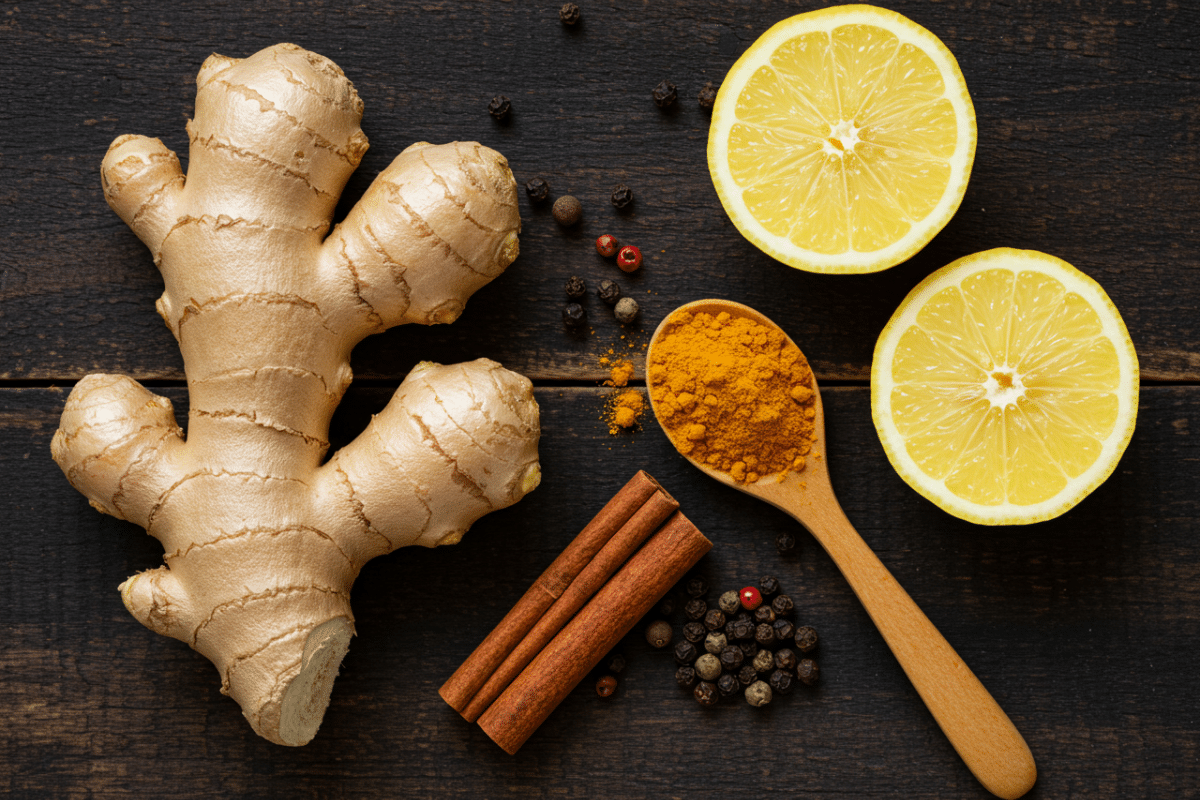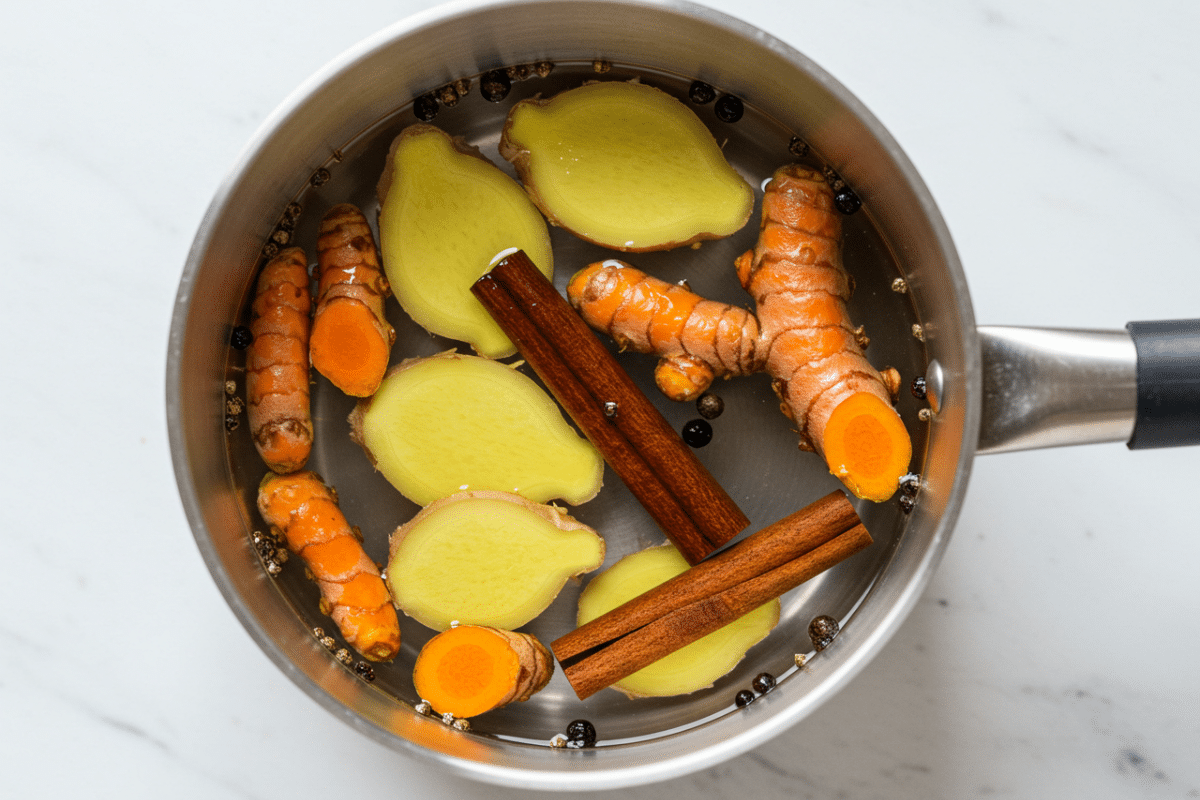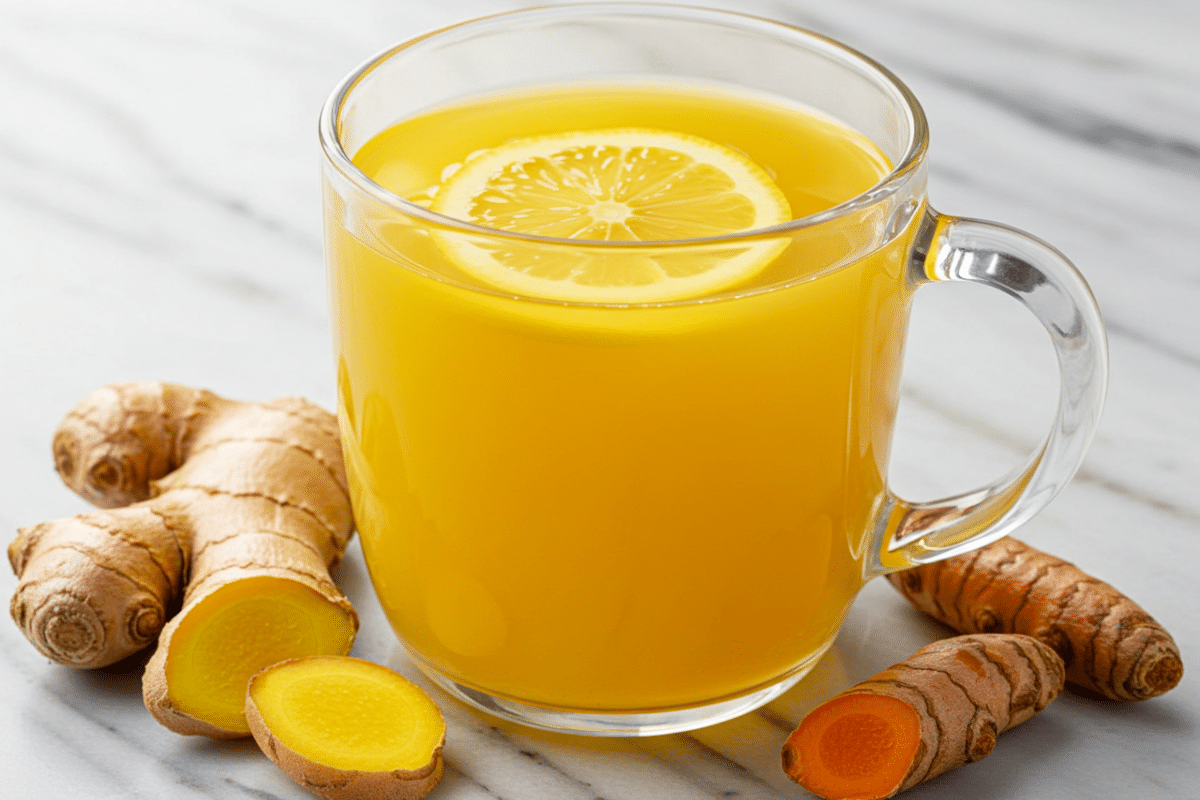This lemon ginger and turmeric tea is a warm, aromatic blend made with simple ingredients you may already have in your kitchen. It’s easy to prepare, naturally flavorful, and perfect for anyone who enjoys cozy, homemade drinks. The combination of ginger, turmeric, lemon, and a touch of pepper creates a balanced, earthy, and citrusy cup that feels inviting in any season.
If you like bright, herb-forward drinks, you might also enjoy my lemon balm tea recipe.
Table of Contents
Why You’ll Love This Lemon Ginger Turmeric Tea
This recipe is simple, versatile, and full of natural flavor.
Simple Ingredients
You only need a few pantry staples—fresh ginger, turmeric, black pepper, and lemon—to build a rich, layered tea.
Warm, Balanced Flavor
Ginger adds gentle heat, turmeric brings earthiness, and lemon provides freshness. Black pepper ties everything together with a subtle spice.
Easy to Customize
Prefer a sweeter cup? Add honey or maple syrup. Want more spice? Increase the ginger or add a cinnamon stick.
Great for Any Season
Serve it warm in cooler weather or chilled over ice in summertime.
Ingredients for Lemon Ginger and Turmeric Tea

A flat lay of ginger, turmeric, lemon, and spices.
- 4 cups filtered water
- 1 (2-inch) piece fresh ginger, thinly sliced
- 1 (2-inch) piece fresh turmeric root, thinly sliced
(or 1 teaspoon ground turmeric) - ¼ teaspoon whole black peppercorns, lightly crushed
- 1 organic lemon, halved
- 1–2 teaspoons honey or maple syrup (optional)
- 1 cinnamon stick (optional)
Each ingredient contributes to the final flavor: ginger adds warmth, turmeric colors the tea beautifully, and lemon brightens the whole cup.
Tips for the Best Flavor
Simmer Gently
Bring the water to a boil, then reduce heat. A gentle simmer helps the flavors infuse without becoming harsh.
Use the Whole Lemon
Adding the squeezed halves to the pot gives extra citrus aroma.
Don’t Skip the Black Pepper
Just a pinch enhances the spice notes and rounds out the flavor.
Optional Cinnamon
Adds a soft sweetness and pairs well with ginger and turmeric.
How to Make Lemon Ginger and Turmeric Tea

Step 1 — Combine Ingredients
In a medium saucepan, add the water, sliced ginger, turmeric, black pepper, and optional cinnamon. Bring to a gentle boil, then lower to a simmer.
Step 2 — Simmer
Let the mixture simmer uncovered for 10–15 minutes until the water turns golden and aromatic.
Step 3 — Add Lemon
Remove from heat. Squeeze in the lemon juice and add the lemon halves to the pot.
Step 4 — Steep & Strain
Let rest for 5 minutes, then strain into mugs or a teapot.
Step 5 — Sweeten
Stir in honey or maple syrup if desired.
Variations
Using Ground Spices
If you don’t have fresh ginger or turmeric:
- 1 tsp ground turmeric
- 1 tsp ground ginger
Strain well to reduce sediment.
Iced Version
Let the tea cool, then pour over ice. Add a lemon slice for brightness.
Creamier Texture
Add a small spoonful of coconut oil and blend briefly until smooth.
Chai-Inspired
Add cloves, star anise, or extra cinnamon during the simmer.
Serving & Storage
How to Serve
Serve warm with a lemon slice or cinnamon stick. Stir before drinking.
How to Store
- Store strained tea in a sealed glass container.
- Refrigerate up to 4 days.
- Reheat gently on the stovetop when ready to serve.
Prep Tip
Keep pre-sliced ginger and turmeric in a jar in the fridge to speed up brewing.

Lemon Ginger and Turmeric Tea
Ingredients
Method
- Add water, ginger, turmeric, pepper, and cinnamon to a saucepan. Bring to a gentle boil, then reduce heat.
- Simmer for 10–15 minutes.
- Remove from heat. Squeeze in the lemon juice and add the lemon halves to the pot.
- Steep 5 minutes, then strain.
- Sweeten if desired and serve warm.
Notes
- Start with less sweetener and adjust to taste.
- Refrigerate leftovers for up to 4 days.
Conclusion
This lemon ginger and turmeric tea is an easy, flavor-rich drink you can enjoy warm or iced. With simple ingredients and plenty of room for customization, it’s a great addition to your homemade beverage collection.
What’s your favorite homemade drink for a cozy day? I’d love to hear in the comments below! And if you’re looking for a treat to enjoy alongside it, these fudgy gluten and dairy-free brownies are a perfect match.
FAQ
Can I use ground spices instead of fresh?
Yes. Use 1 tsp ground ginger and 1 tsp ground turmeric. Strain well to reduce sediment.
Can I drink it cold?
Yes—cool completely and serve over ice.
Why add black pepper?
It adds subtle warmth and enhances the overall flavor.
Can I make it ahead of time?
Yes. Store up to 4 days refrigerated in a sealed container.
Does turmeric stain?
Yes—handle carefully and clean surfaces right away.





